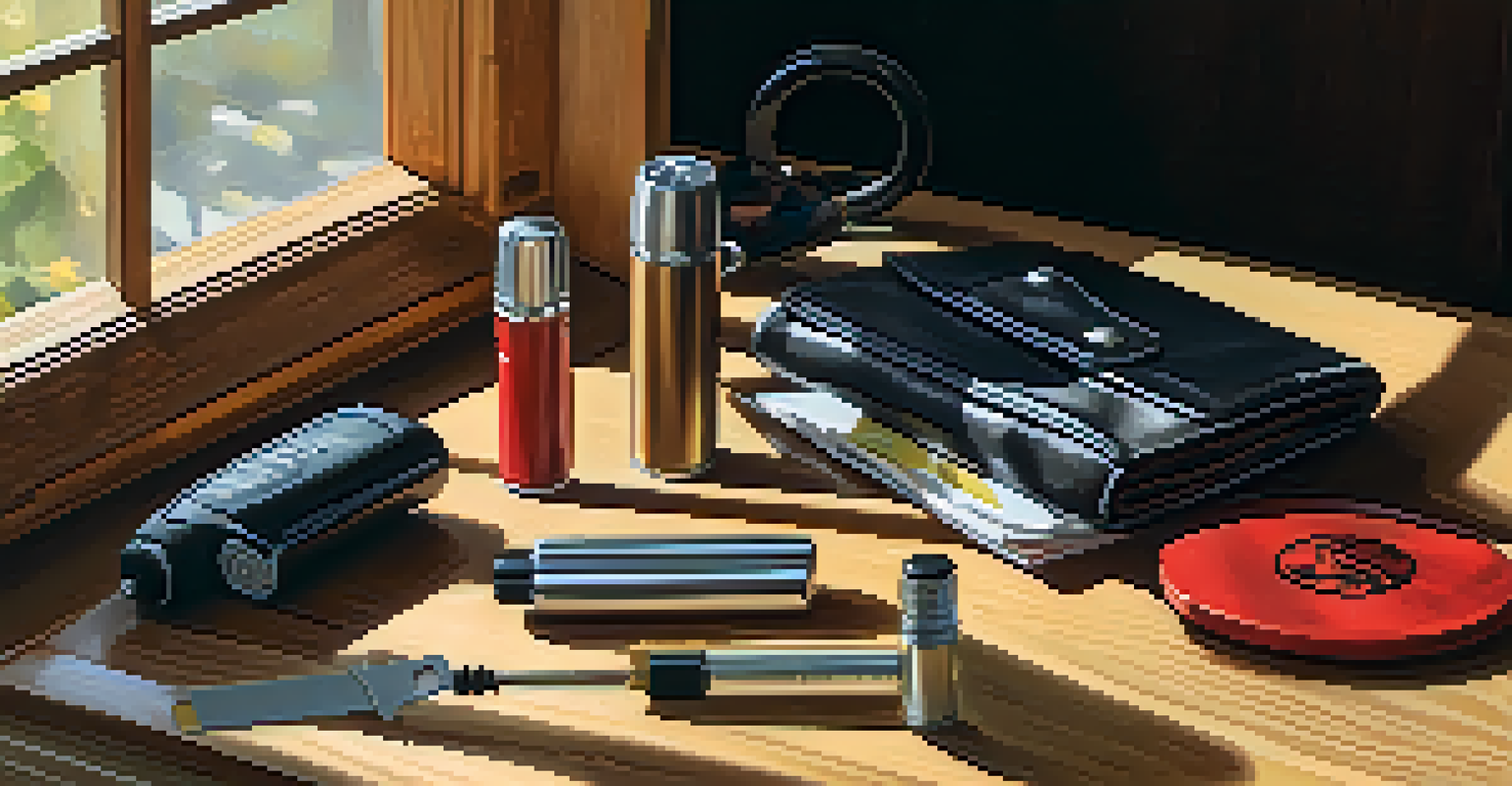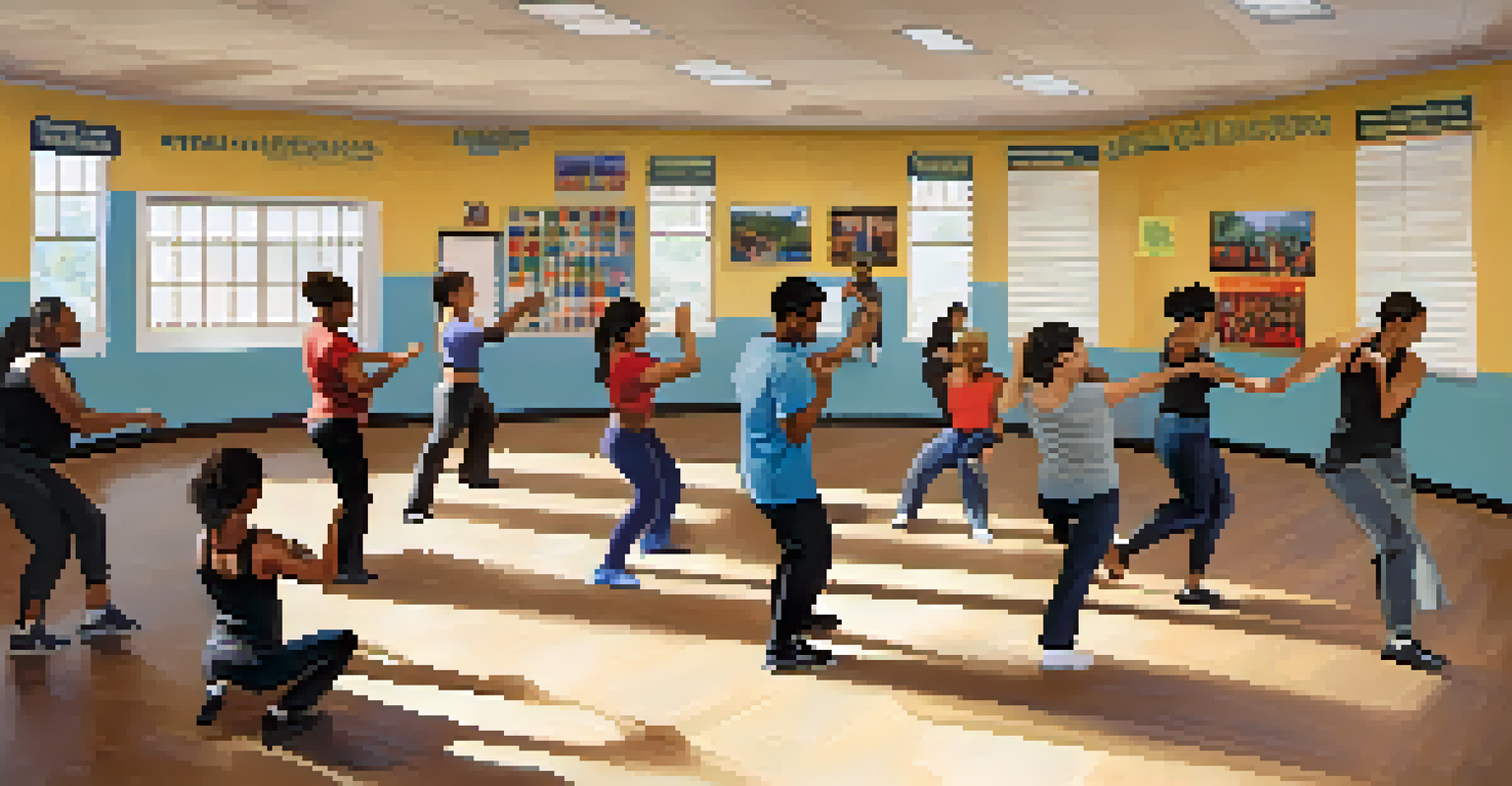How to Choose the Right Self Defense Tools for Night Outings

Understand Your Environment Before Choosing Tools
Before heading out for the night, it's crucial to assess your surroundings. Think about the areas you'll be visiting, the types of crowds, and the overall safety of those environments. Each location may present unique risks that can help inform your choice of self-defense tools.
The best defense is a good awareness.
For instance, a busy urban area may have different safety concerns compared to a quiet neighborhood. Consider factors like lighting, foot traffic, and local crime rates. This understanding will guide you in selecting tools that are most suitable for the specific situations you might encounter.
By being aware of your environment, you can choose self-defense tools that are not only effective but also practical for your night out. This proactive approach can significantly enhance your personal safety.
Evaluate Your Personal Comfort and Skills
When selecting self-defense tools, personal comfort and skill level are key. If you're not comfortable using a particular tool, it might not serve you well in a real-life situation. Take time to practice with any tool you consider to ensure you can handle it confidently if needed.

For instance, pepper spray may be an effective tool, but if you’ve never used it before, you might hesitate in a moment of panic. Alternatively, a personal alarm can be a great option for someone who prefers not to engage physically. Assessing your comfort level will help you choose tools that you can effectively wield in an emergency.
Assess Your Environment First
Understanding your surroundings helps you select the most effective self-defense tools for your night out.
Ultimately, self-defense is about empowerment. Choose tools that resonate with you and that you feel confident using, as this will increase your chances of staying safe.
Consider Legal Restrictions and Regulations
It's essential to be aware of the legal restrictions regarding self-defense tools in your area. Different regions have varying laws concerning items like pepper spray, knives, or stun guns. Familiarizing yourself with these regulations can prevent legal issues should you need to use your chosen tool.
It is better to be prepared for an opportunity and not have one than to have an opportunity and not be prepared.
For example, some places may have restrictions on the size of knives or the strength of pepper spray. Additionally, carrying items deemed illegal can lead to unwanted consequences, even if your intentions are purely for protection. Always do your homework to ensure compliance with local laws.
By understanding what tools are legal to carry, you can make informed choices and avoid potential legal troubles. This knowledge not only keeps you safe but also empowers you to protect yourself effectively.
Choose Tools That Are Easy to Access and Carry
When selecting self-defense tools, accessibility is a critical factor. You want to ensure that whatever you choose is easy to carry and can be quickly accessed in an emergency. Bulky or complicated items may not be practical for a night out, where speed is often crucial.
Consider items like keychain alarms or small pepper spray canisters that can fit comfortably in your purse or pocket. The more accessible your tools are, the more likely you are to use them should the need arise. Think about how you typically carry your belongings and choose tools that integrate seamlessly into that setup.
Prioritize Comfort and Skills
Choosing tools you are comfortable with and skilled at using increases your confidence and effectiveness in emergencies.
Ultimately, the best self-defense tool is one that you can reach quickly when it matters most. Prioritize those that you can carry with ease, ensuring you are always prepared.
Think About Non-Physical Self-Defense Options
While physical self-defense tools are often the first things that come to mind, non-physical options can be equally effective. Consider tools such as personal alarms or even self-defense apps on your smartphone. These can create distractions or alert others to your situation without direct confrontation.
For example, a personal alarm emits a loud sound that can deter an attacker and attract attention from passersby. Similarly, self-defense apps can provide quick access to emergency contacts or GPS tracking. Incorporating these options can complement your physical tools and enhance your overall safety strategy.
Remember, self-defense isn't just about fighting back; it's also about smart choices that can help you avoid dangerous situations altogether. Exploring non-physical options broadens your self-defense toolkit.
Test Your Self-Defense Tools Before Use
Once you've chosen your self-defense tools, it's vital to test them before relying on them during a night out. Familiarity with your tools can build confidence and ensure you understand how to use them effectively. Whether it's practicing with pepper spray or testing the sound of a personal alarm, practice makes perfect.
Consider setting aside time to familiarize yourself with each tool's operation. This not only boosts your confidence but also helps you identify any potential issues beforehand. After all, you wouldn’t want to fumble with a tool when it’s most needed.
Stay Legal and Informed
Being aware of local laws regarding self-defense tools ensures you can protect yourself without facing legal issues.
Testing your tools can also help you become more comfortable in high-stress situations. The more prepared you feel, the more likely you are to remain calm and act decisively if the need arises.
Stay Informed and Educated About Self-Defense
Choosing the right self-defense tools goes hand in hand with staying informed about self-defense strategies. Engaging in self-defense classes or workshops can provide valuable skills that complement your tools. Knowledge of how to react in various situations can empower you to use your tools more effectively.
For instance, understanding the psychology of an attacker or practicing verbal de-escalation techniques can be just as important as physical tools. Many local community centers offer classes that focus on personal safety and self-defense. Look for programs that teach both physical techniques and situational awareness.

Additionally, staying informed about current trends in personal safety can help you adapt your self-defense strategies. Continuous learning ensures you remain prepared and confident, making your nights out safer.